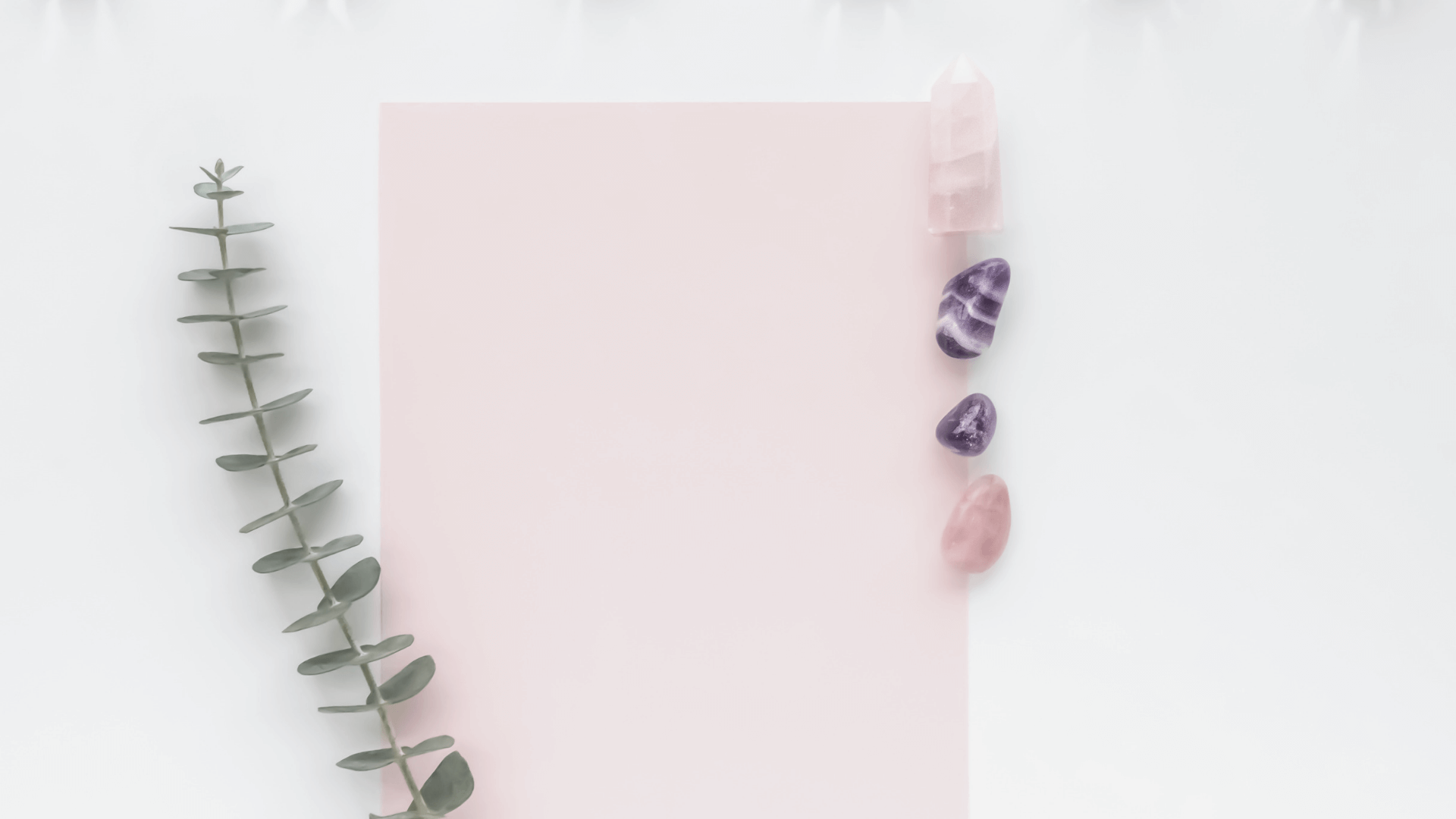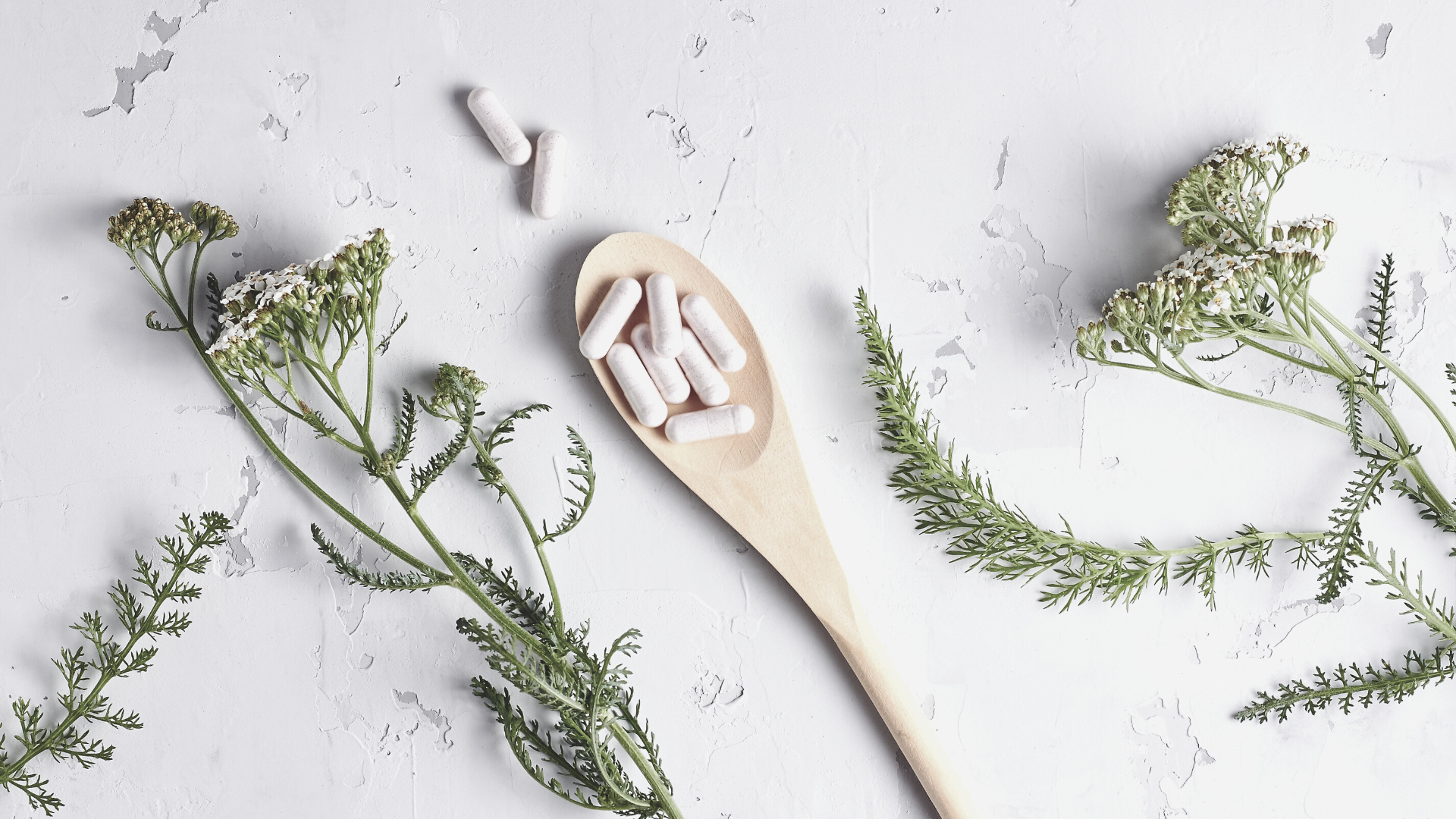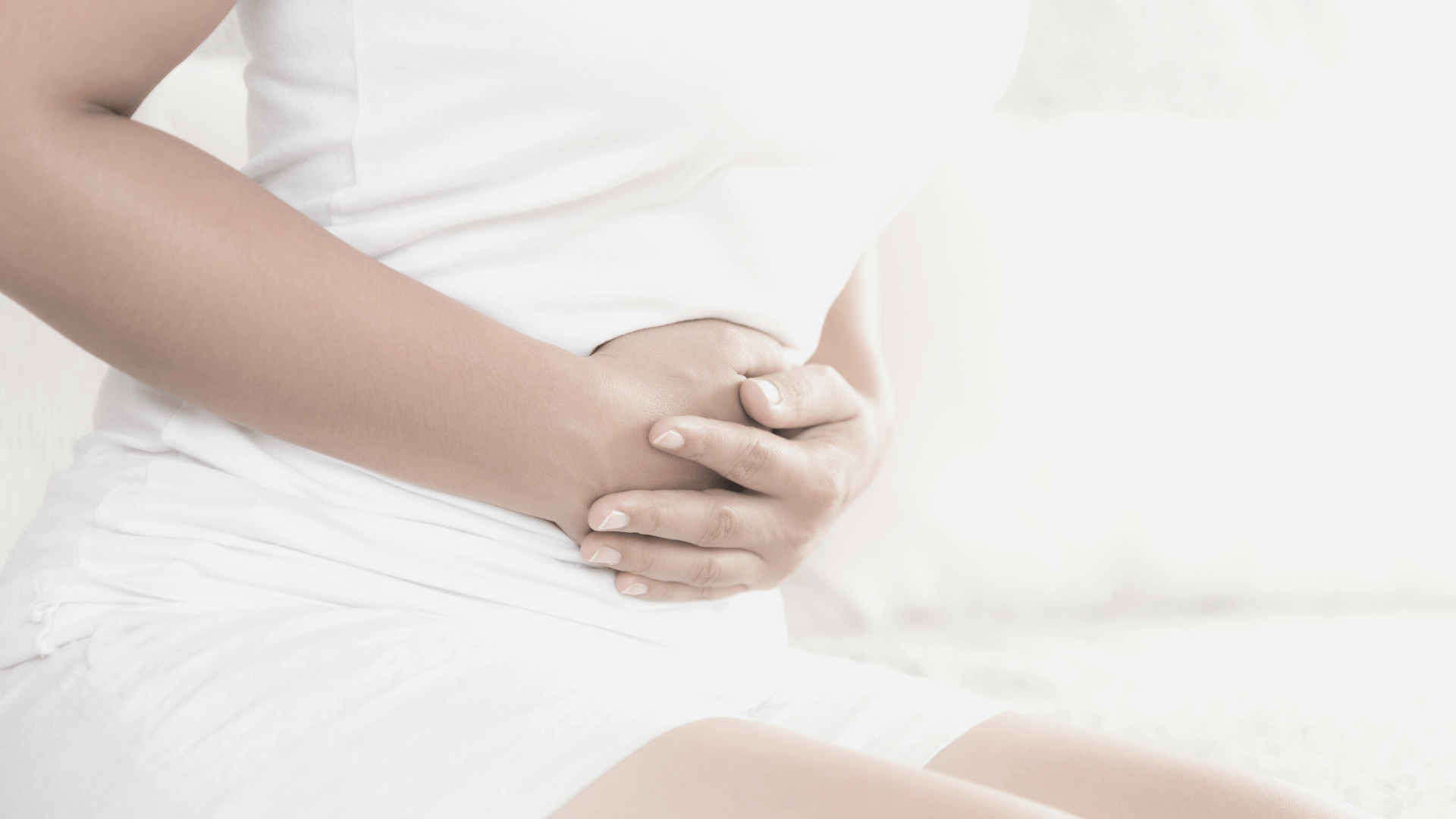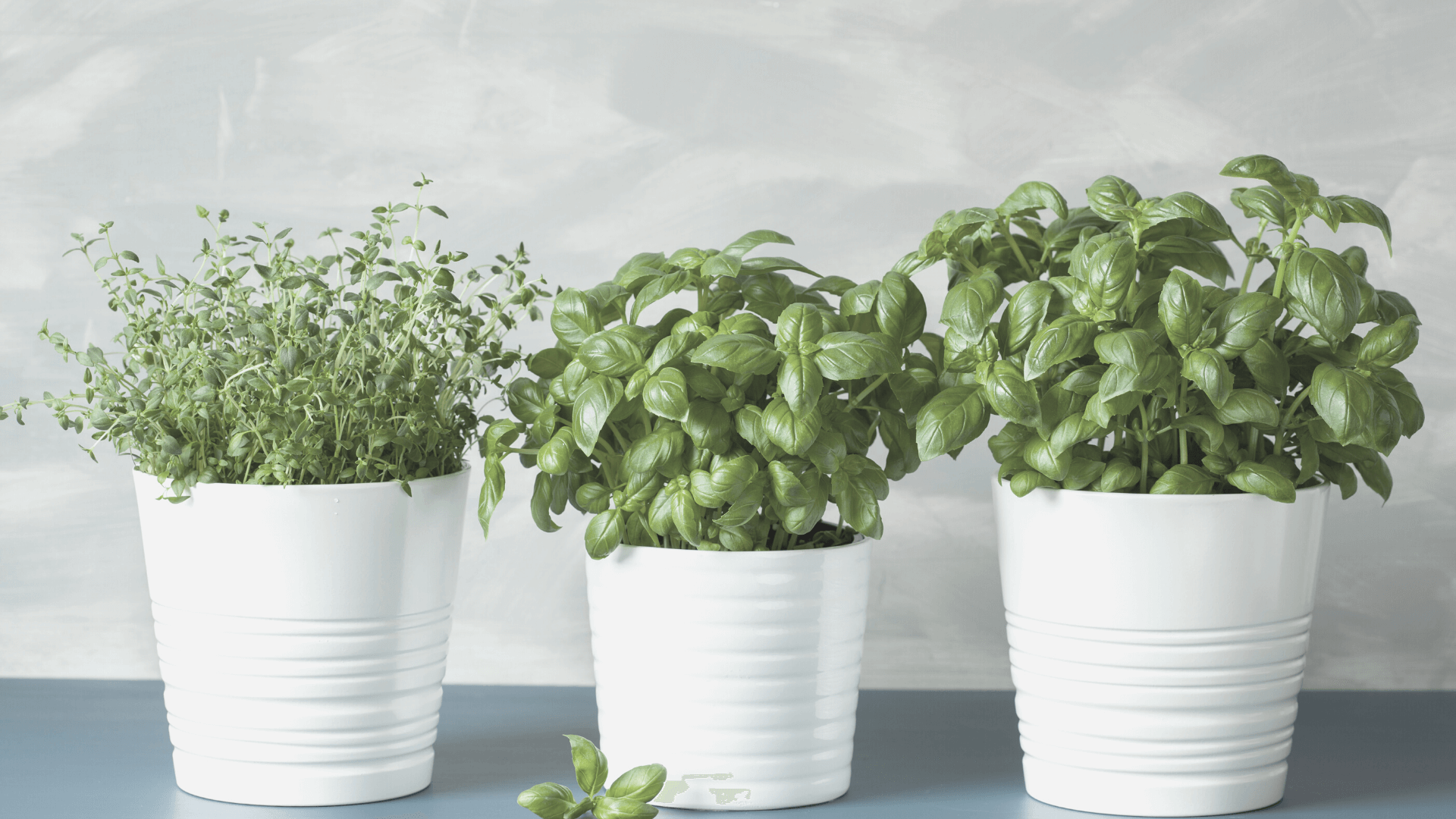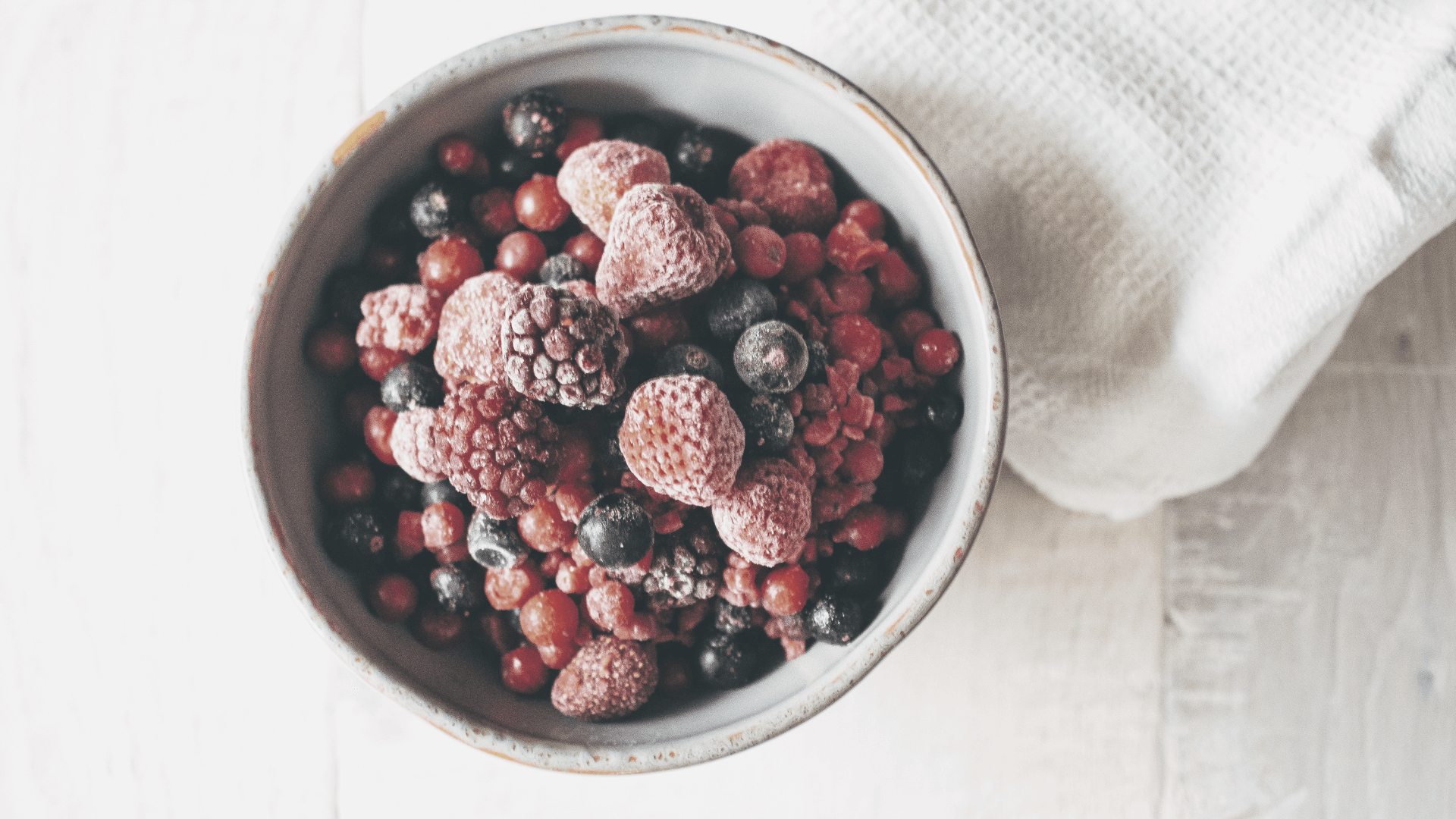What do you think are the best teas for stress and depression?
I wanted to research this topic after last week’s podcast episode on Anxiety and Your Gut released.
During the podcast, Alison mentioned that she no longer drinks caffeine.
Instead, she said, she drinks teas including, “Throat Coat, and ones with ginger and turmeric.”
So I thought it would be fun to find the best cup of tea that produces a calming effect in order to give you option.
Best Teas for Stress and Depression [11 Teas to Boost Mood]
Click HERE to save this best teas for stress and depression for later.
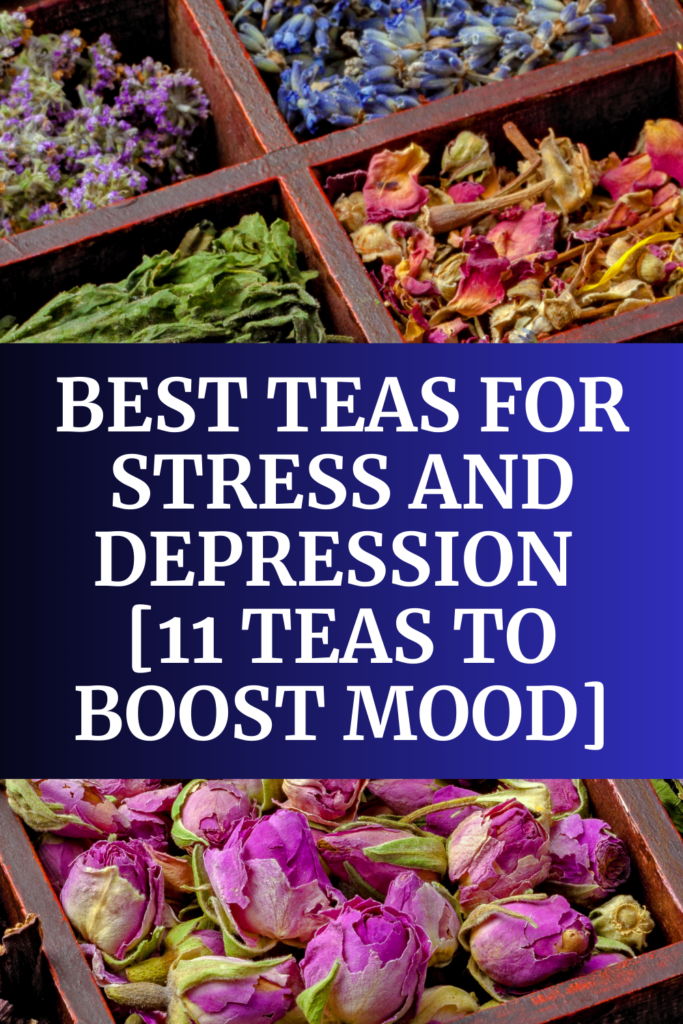
Here are 6 + 5 more teas to boost mood (that I’ll cover in this post):
- Chamomile Tea
- Peppermint Tea
- Lemon Balm Tea
- Lavender Tea
- Holy Basil Tea
- Valerian Root Tea
- 5 misc. options
Before I dive into far more information on the above teas, let me lay out some of the most common symptoms of stress, depression, and even anxiety.
Stress Symptoms
I’ve written about stress at length on this website.
Because of it, I already have a list of 23 symptoms of stress:
- Acne. Gut-brain-skin.
- Easily agitated. Are you on edge and snapping more than usual?
- Feeling overwhelmed.
- Having difficulty relaxing and calming/quieting the mind.
- Avoiding other people.
- Chronic anxiety symptoms.
- Decreased energy. The effects of too much stress can be draining.
- Headaches. Physical pains can and do catch up when we are under too much stress.
- Upset stomach. This can include any or all of: diarrhea, constipation, alternating diarrhea and constipation and/or nausea.
- Insomnia.
- Illness due to a lowered immune system.
- Clenched jaw.
- Constant worry.
- Inability to focus.
- Lack of breath. How often do you find yourself without breath? You’re holding it in, not taking deep breaths, and it’s creating even more stress.
- Changes in appetite. This could be eating more or less. Some stress eat; others don’t eat at all.
- Chronic pain.
- Changes in libido.
- Rapid heartbeat.
- Sweating.
- Increased use of drugs and/or alcohol.
- Exercising more or less.
- Difficulty making decisions.
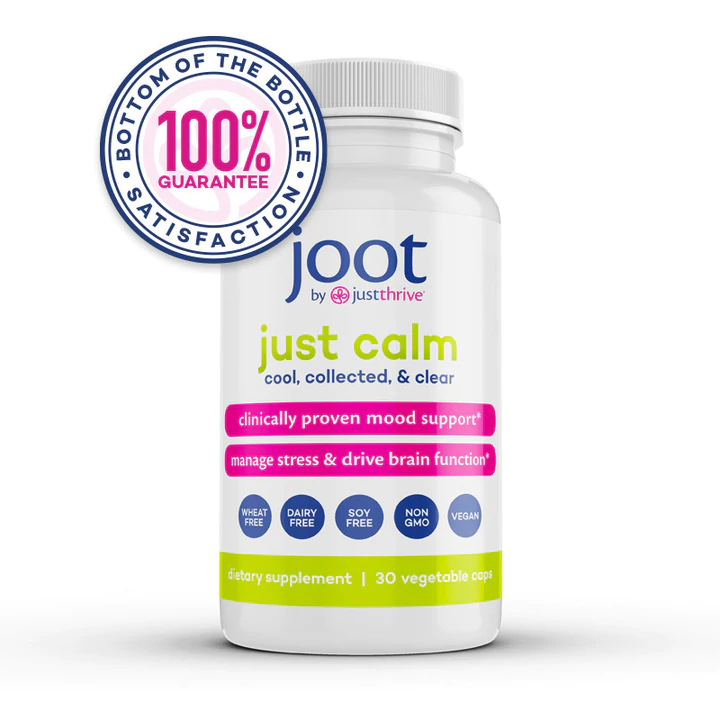
Symptoms of Depression
Depression is a topic I’ve talked less about on this blog.
And it’s not because there isn’t a huge connection to the gut (once again gut-brain axis), but because it’s not a topic that I’m versed on really at all.
In any case, here are 12 depression symptoms according to the Mayo Clinic:
- Feelings of sadness, tearfulness, emptiness or hopelessness
- Angry outbursts, irritability or frustration, even over small matters
- Loss of interest or pleasure in most or all normal activities, such as sex, hobbies or sports
- Sleep disturbances, including insomnia or sleeping too much
- Tiredness and lack of energy, so even small tasks take extra effort
- Reduced appetite and weight loss or increased cravings for food and weight gain
- Anxiety, agitation or restlessness
- Slowed thinking, speaking or body movements
- Feelings of worthlessness or guilt, fixating on past failures or self-blame
- Trouble thinking, concentrating, making decisions and remembering things
- Frequent or recurrent thoughts of death, suicidal thoughts, suicide attempts or suicide
- Unexplained physical problems, such as back pain or headaches
Symptoms of Anxiety
In her book, The Anxiety Healer’s Guide: Coping Strategies and Mindfulness Techniques to Calm the Mind and Body, Alison lays out the following physical symptoms associated with anxiety (but mentions they are not limited to):
- increased heart rate
- shortness of breath
- sweating
- shaking
- nausea
- hyperventilation
- chest pain
- light-headedness
- fainting
- muscle weakness
- feeling of choking or throat tightening
- muscle tension, such as clenching your jaw
- feeling weak or tired
- sweating
- hot flashes
- chills
- dry mouth
- headache
- gastrointestinal symptoms such as nausea, cramping, or diarrhea
- increased frequency to urinate
Stress, anxiety, and depression are all real; they can all be very severe as shown through the symptoms above.
What that means for you and for this post around tea is the idea that tea can be used as a replacement in your daily life for something else which might be triggering symptoms (i.e. caffeine, sugary beverages, alcohol, etc.).
The point is not to suggest that tea is a cure. IT’S NOT!
Remember, it’s also a good idea to seek out professional help with any and all of the above even if you think your symptoms are not severe.
Mental health issues are nothing to be:
- A. Ashamed of or
- B. Scared to address.
With that, let’s talk about some different types of teas and why an herbal tea blend might be something to start incorporating into a daily routine.
6 Teas for Stress and Depression
Click HERE to save these 6 for later.
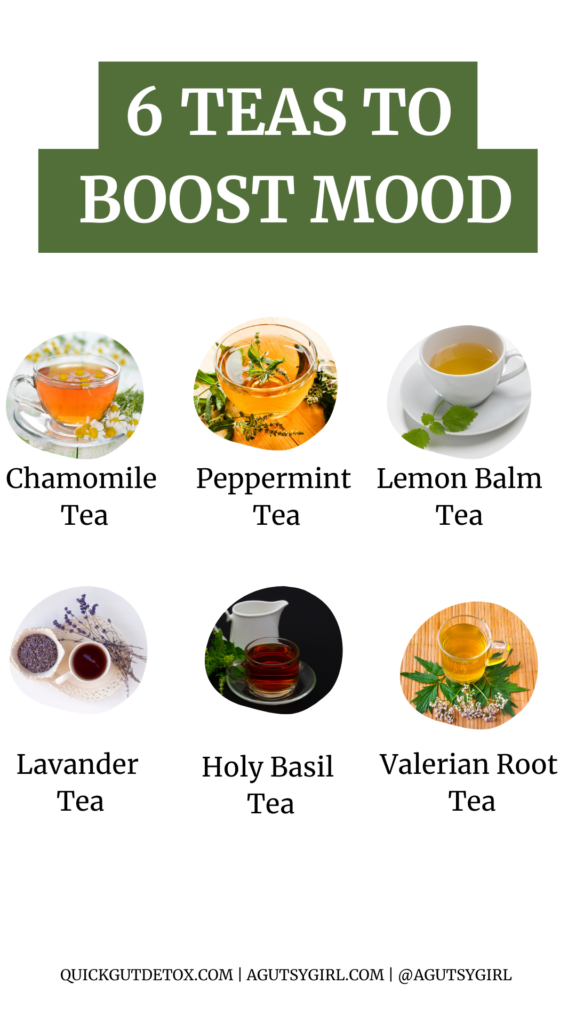
Chamomile Tea
Since this is a gut health website, I want to start by sharing this,
According to the NIH,
Chamomile has been valued as a digestive relaxant and has been used to treat various gastrointestinal disturbances including flatulence, indigestion, diarrhea, anorexia, motion sickness, nausea, and vomiting (34, 35).
Furthermore, Pukka states that, “the chamomile flower is probably the most widely used herbal tea for soothing stress and nervous tension.”
They also state (putting both digestion and anxiety together), “Chamomile’s relaxing properties are especially useful when anxious digestion is contributing to sleep issues.”
Therefore, a cup of warm, Chamomile flowers tea prior to bed might improve sleep quality which always helps daytime stress and anxiety.
Peppermint Tea
Another type of tea that has been shown to help with both digestion and stress levels is Peppermint tea.
This is due mostly to the menthol in peppermint that is a natural muscle relaxant.
It is for this same reason (muscle relaxant) why those who have severe bloating can also find relief with peppermint.
However, do make note that it’s also due to the relaxant that it’s not something for those of you with GERD or Reflux.
Lemon Balm Tea
First, what is Lemon Balm? Like you, I always wondered, too.
It is a member of the mint family, and is considered a calming herb.
The reason it makes this list of the best teas for stress and depression is because it was used as far back as the Middle Ages to reduce stress and anxiety, promote sleep, improve appetite, and ease pain and discomfort from indigestion (including gas and bloating, as well as colic). (source)
Lavender Tea
This one should be fairly obvious, since I’m constantly talking about how I infuse lavender into my life mostly via essential oils through a diffuser.
However, another great option is to use Lavender tea.
In fact, one study found “that consumption of lavender herbal tea can reduce depression and anxiety scores and since it is inexpensive and accessible, it is suggested to be used as a complementary treatment in reducing anxiety and depression.”
Even more benefits of the tea include:
- sedative effects (sleep aid)
- reduces inflammation
- supports the digestive system (amen!)
- boosts immune health
Holy Basil Tea
In her book, Body Into Balance: an herbal guide to holistic self-care, Maria Noel Groves discusses Holy Basil as a great herb for “its ability to calm and energize, relieve anxiety and grief, and balance cortisol and blood sugar levels.”
Maria also states that the herb is amenable to any kind of remedy, fresh or dry, but that it is particularly divine as tea.
Valerian Root Tea
Commonly used as an ingredient in sleep aid supplements as a result of its calming properties, the Valerian Root also makes a wonderful tea.
Healthline also states,
What’s more, valerian may help you relax and may have benefits for people who experience anxiety and other symptoms.
A top recommended Valerian tea is the Traditional Medicinals Organic Nighty Night Valerian Herbal Tea.
5 Misc. Teas for Stress and Depression
Click HERE to save these 5 for later.
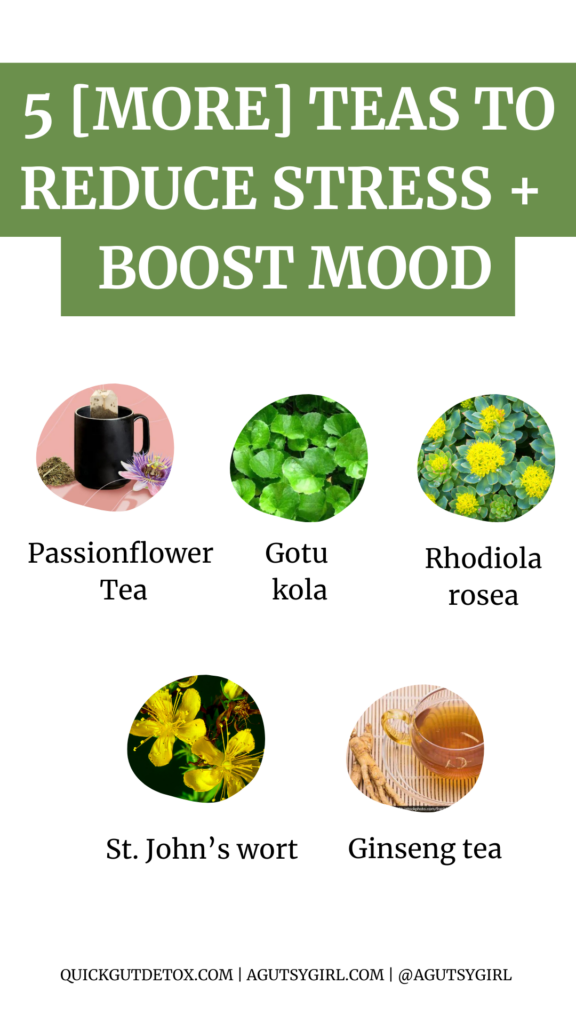
There are a variety of herbs and other ingredients that make great tea for the implications in this post.
They include:
- Passionflower Tea – “Scientists believe passionflower works by increasing levels of a chemical called gamma aminobutyric acid (GABA) in the brain. GABA lowers the activity of some brain cells, making you feel more relaxed.” (source)
- Gotu kola – oftentimes considered a brainpower boost
- Rhodiola rosea – Rhodiola can be used to reduce stress, combat fatigue, increase mental performance and improve physical and mental fitness and resilience.
- St. John’s wort – While it is widely prescribed for depression in Europe, St. John’s wort is still being studied for its long-term effects. (I personally question this here in the United States because doesn’t it always seem like we question the more natural approach in the United States when other countries gladly prescribe and accept them?)
- Ginseng tea – find 10 ginseng health benefits HERE
Ingredients in Throat Coat Tea
I also wondered why Alison spoke so highly of the Throat Coat tea (as a tool for stress, anxiety, and depression).
When I looked up the ingredients in Throat Coat tea bags here is what I found:
- licorice root
- slippery elm bark
- marshmallow root
- wild cherry bark
- fennel fruit
- cinnamon bark
- orange peel
While cinnamon is a stress-relieving aroma, I personally believe that this particular tea is better as an herbal medicine for sores, aches, pains, and overall inflammation.
Remember, that does not mean that those can’t and don’t go hand-in-hand with stress, anxiety, and depression.
Instead, it’s that I think other herbs are more superior for helping with the stress, anxiety, and depression.
Tea Health Benefits
There are many health benefits to drinking tea besides addressing chronic stress, anxiety, and depression.
Positive effects of drinking tea after a long day (in addition to improved sleep and relaxation) are that it’s a natural way to soothe an upset stomach, alleviate bloat and may even reduce blood pressure due to everyday lifestyle factors affecting your gut.
The positive effects tea can have on both the nervous system and digestive system are good enough reasons to give them a try.
Anyways, I hope this post has been helpful.
If you liked this post, you might also enjoy:
Xox,
SKH
🤰 bloating be gone! weight loss through optimal gut health for women
💃ʜᴇᴀʟ ʏᴏᴜʀ ɢᴜᴛ. ʜᴇᴀʟ ʏᴏᴜʀ ʟɪfe.
🫶🏻 founder gutbyome.com


